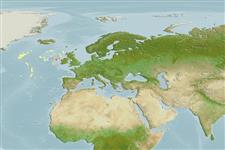Environment: milieu / climate zone / depth range / distribution range
Ecology
Marine; bathydemersal; depth range 1000 - 1500 m (Ref. 42989). Deep-water
Northeast Atlantic: east slope of northernmost part of the Mid-Atlantic Ridge and from the west of Ireland.
Size / Weight / Age
Maturity: Lm ? range ? - ? cm
Dorsal spines (total): 0; Dorsal soft rays (total): 41; Anal spines: 0; Anal soft rays: 35; Vertebrae: 47. No coronal pore, preoperculo-mandibular pores 7, short head (24-25% SL), small gill slit (20.4-21.5% HL) that is low (end of operculum below level of eye), opercular flap small, triangular; pectoral fin long (66% HL) with 1 notch ray and uppermost ray level with posterior end of mouth cleft (Ref. 42989).
Holotype taken from a depth of 1,000 m (Ref. 33021).
Life cycle and mating behavior
Maturities | Reproduction | Spawnings | Egg(s) | Fecundities | Larvae
Andriashev, A.P., 1998. A review of recent studies of Southern Ocean Liparidae (Teleostei: Scorpaeniformes). Cybium 22(3): 255-266. (Ref. 30823)
IUCN Red List Status (Ref. 130435)
Threat to humans
Harmless
Human uses
Tools
Special reports
Download XML
Internet sources
Estimates based on models
Phylogenetic diversity index (Ref.
82804): PD
50 = 0.5000 [Uniqueness, from 0.5 = low to 2.0 = high].
Bayesian length-weight: a=0.01000 (0.00244 - 0.04107), b=3.04 (2.81 - 3.27), in cm total length, based on all LWR estimates for this body shape (Ref.
93245).
Trophic level (Ref.
69278): 3.3 ±0.5 se; based on size and trophs of closest relatives
Resilience (Ref.
120179): High, minimum population doubling time less than 15 months (Preliminary K or Fecundity.).
Fishing Vulnerability (Ref.
59153): Low vulnerability (10 of 100).
